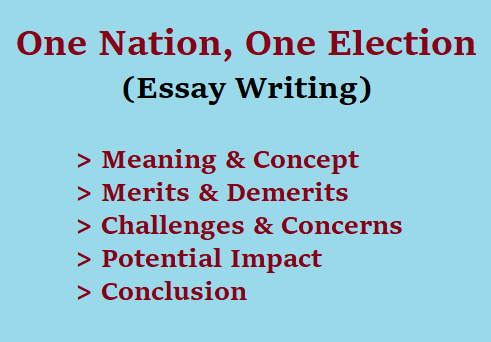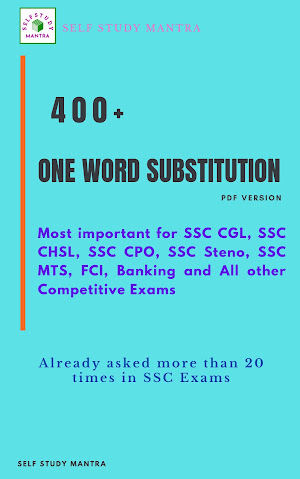One Nation One Election is hot topic at present time in India. Indian Government is working hard to implement the concept of One Nation One Election so that the Government can work properly without any pressure of election every year. Lets explore more about One Nation One Election in this essay One Nation One Election.
Essay on One Nation One Election
"One Nation, One Election" is a concept that has garnered significant attention and debate in the Indian political landscape. It proposes the synchronization of all state and national elections to be held simultaneously, once every five years. This concept aims to streamline the electoral process, reduce election related expenditures, and enhance governance.
Present Government is working on implementation of One Nation One Election as it is one of the election promise of BJP Government. The Government wants to implement One Nation One Election as it has numerous benefits such as minimizing election cost and streamlining of governance.
Lets explore merits, challenges, and potential impact of One Nation One Election on the Indian political landscape.
Merits of One Nation One Election
Reduction in Election Costs: One of the primary advantages of this concept is the significant reduction in election related costs. Currently, India witnesses frequent elections at the state and national levels, which incur substantial expenses for the government, political parties, and candidates. Conducting all elections simultaneously can lead to considerable cost savings.
Minimization of Campaigning Distractions: Frequent elections often divert the attention of political leaders and policymakers away from governance and development. One Nation One Election can minimize these distractions, allowing elected representatives to focus on their duties and responsibilities.
Enhanced Governance Continuity: With simultaneous elections, there would be a clear five year (full term) governance cycle. This could result in better planning and execution of policies and projects, as governments would not be in a perpetual election mode. Download PDF of this Essay: Click Here
Reduced Electoral Polarization: Frequent elections can lead to continuous political polarization. Simultaneous elections could help reduce the divisive and polarizing aspects of electoral politics, fostering a more constructive political environment.
Increased Voter Turnout: By reducing the frequency of elections, One Nation, One Election may encourage higher voter participation. Voters may be more inclined to exercise their franchise if they do not have to vote as frequently.
One Nation One Election: Challenges and Concerns
Constitutional and Legal Hurdles: Implementing simultaneous elections requires amendments to the Constitution and various laws. This process can be lengthy and contentious, as it involves reconciling federal and state interests.
Unequal Election Cycles: States with shorter or longer terms in their legislatures would need to adjust their election cycles to align with the national election cycle. Achieving this uniformity could be challenging.
Dominance of National Issues: Simultaneous elections may result in the dominance of national issues over regional ones. This could potentially weaken the representation of regional interests.
Operational Challenges: Conducting a massive electoral exercise like One Nation, One Election requires robust infrastructure, including the availability of electronic voting machines, security personnel, and logistical support. Ensuring this infrastructure is up to the task across all states and union territories is a significant challenge.
Impact on State Politics: Regional parties and local issues could be overshadowed in the pursuit of national agendas. This may impact the diversity of representation and the ability to address localized problems effectively.
One Nation One Election: Potential Impact
Political Stability: One Nation, One Election could potentially lead to more stable governments with a clear mandate, as coalitions and hung assemblies might become less frequent.
Resource Optimization: The consolidation of electoral processes would lead to resource optimization, with significant savings that can be channeled into development initiatives.
Better Policy Implementation: Reduced political distractions could result in better policy implementation and governance, ultimately benefiting the public.
Erosion of Regional Autonomy: There is a concern that One Nation One Election could undermine the autonomy of states and their ability to address local issues effectively.
Challenges in Implementation: The practical challenges of implementing this reform should not be underestimated, including the need for synchronized logistical and security arrangements.
Conclusion
"One Nation, One Election" is a reform that warrants careful consideration and deliberation. While it offers the potential for cost savings, enhanced governance continuity, and reduced electoral polarization, it also presents significant challenges related to constitutional amendments, regional representation, and operational logistics. Policymakers and stakeholders must engage in a robust and inclusive dialogue to weigh the pros and cons of this concept thoroughly. Any decision regarding the implementation of One Nation, One Election should prioritize the principles of federalism, democratic representation, and the welfare of the Indian electorate.
Hope you liked this Essay on One Nation One Election and it helped you in understanding the concept of One Nation One Election and also helped in your exam preparation.
Also Read:
- 20 Most Important Essay Topics for IBPS PO Mains Exam
- Essay on Free and Fair Election
- Essay on Mission Chandrayaan-3
- Trending Essay Topics
Essay on One Nation One Election for Competitive Exams, Essay on One Nation One Election, One Nation One Election,























3 Comments
thank you
ReplyDeleteThanku so much
ReplyDeleteeasy and informative
ReplyDelete